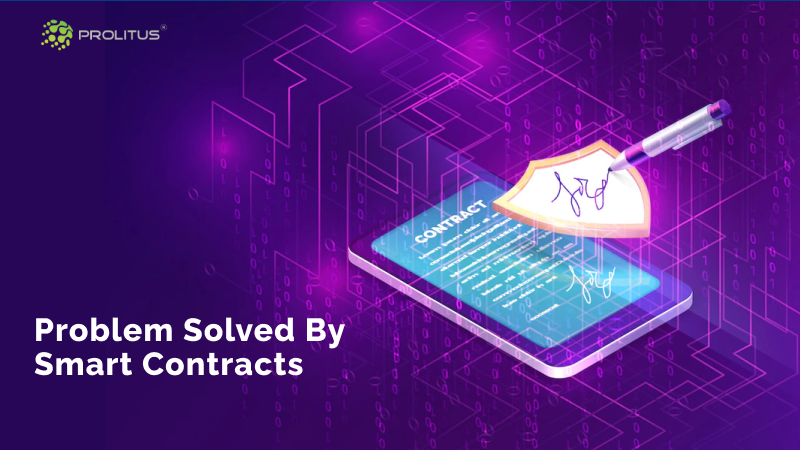Smart contracts are a new technology revolutionizing how business agreements are made and enforced. Based on revolutionary blockchain technology, these digital contracts allow individuals to set up agreements without needing third parties or intermediaries. Smart contracts enable users to exchange money, property, shares, or anything of value conflict-free while avoiding the costs and delays associated with traditional contract execution.
The use of smart contracts has become increasingly popular due to their ability to facilitate transactions between two anonymous parties over the internet securely and reliably. By using smart contract applications, businesses can create trustless agreements that ensure that all parties receive what they agreed upon without risk of fraud or tampering. The code written into each contract guarantees that everyone involved follows through with their promises, which helps eliminate disputes and reduce document processing time drastically.
Why businesses need smart contracts
Smart contracts are a revolutionary technology that has already made its way into the business world. They offer businesses a secure, automated, and cost-effective way to manage transactions and agreements between two parties. Smart contracts enable businesses to quickly and securely exchange assets, such as money or valuable assets over the internet, without fear of tampering or fraud.
Businesses can use smart contracts to reduce paperwork and streamline processes, allowing them to automate mundane tasks such as payments or deliveries. This automation helps businesses save time and money while also reducing errors that may occur with manual data entry. By using smart contracts, businesses can also be more transparent with their customers by providing real-time updates on the status of orders or transaction requests. Additionally, because smart contracts are stored on distributed ledgers they provide an immutable record of all involved transactions which increases trust between two parties when engaging in financial dealings.
Problem solved by smart contract
The use of smart contracts is expected to solve a wide range of problems, which will make some complicated processes more straightforward and more accessible to everyone. For example, many initial coin offerings (ICOs) use smart contracts as their foundation. Because of this, they help people get more investors and grow their businesses to the fullest extent possible. In fact, some companies believe that these phrases accurately reflect the situation. Some of the major problems that can be solved by smart contracts easily are as follow:
Transparency in doing business with the third party
Because everyone involved has access to the same information simultaneously, it is much harder to change the terms of the contract. Because they are based on blockchain technology, smart contracts are able to guarantee the immutability of data. This makes it possible for parties to enter into contracts and agreements with one another without first having to become acquainted with one another. This eliminates the risk of conditions being violated or errors occurring during the management or execution of the contract.
During the length of the contract, all parties have access to the data and information about the contract, and all transactions are copied so that all parties have a record of what has happened. This openness gives the parties a sense of safety and trust.
Autonomy
The need for intermediaries that the parties may trust or human participation in the process is no longer necessary, thanks to the use of smart contracts, which provide the parties more autonomy and independence.
The built-in characteristics of smart contracts offer additional benefits, such as a reduction in processing times and costs.
Cost Reduction
When it comes to business, cost reduction is critical. And one way to achieve this is through the use of smart contracts. A smart contract is a type of contract that uses blockchain technology. This technology allows for secure and transparent transactions between parties. Additionally, it can minimize contracting costs and eventually result in greater company profitability. Here are four ways in which smart contracts can help reduce costs in business:
- Smart contracts can streamline the signing process by eliminating the need for multiple signatures. This saves time and money, as well as reduces the risk of fraud.
- They can automate specific contractual processes, such as the settlement of payments or the delivery of goods. This can save businesses time and money while ensuring accuracy and consistency across agreements.
Speed of Transaction
There is a growing trend among businesses to conduct transactions through smart contracts. This technology allows quick and secure transactions between parties without needing an intermediary. As a result, transactions can be performed quickly and easily without any interference from third-party intermediaries.
There are a few benefits to using smart contracts in business transactions. For one, they are secure; no third party is necessary to verify or approve the contract. Furthermore, they are transparent; all information relating to the contract is available to all parties at all times. This makes it easy for both sides to understand and comply with the terms of the deal.
Smart contracts have several other advantages as well. For example, they can reduce the costs associated with traditional transaction processing methods such as payment processing and escrow services.
Automatic Update
When it comes to software, businesses have long been fixated on manually updating their systems. But with the advent of smart contracts, this is starting to change. Automatic updates using smart contracts can save businesses time and money. Here’s why:
- Automatic updates reduce manual work: One of the most significant benefits of automatic updates using smart contracts is that they eliminate the need for manual work. This saves companies time and money because it eliminates employees’ need to scan through files and update programs.
- Automatic updates are secure: Automatic updates using smart contracts are also secure because they use cryptography to ensure that only authorized users can access the update files. This protects businesses from data breaches and other security threats.
Future of Smart Contract
When it comes to the future of smart contracts, there are many possibilities. However, one key question is whether or not they will take off as a mainstream technology. This might be difficult because people may be hesitant to use them if they need to understand how they work. Additionally, some regulators are still working out how best to oversee them.
Despite these challenges, there are many proponents of smart contracts who believe that they have great potential. For example, they could create secure and automated agreements between parties. In addition, they could also be used to automate financial transactions and processes.
The future of smart contracts is still in question, but there are a few things we can predict. Firstly, the use of blockchain technology will only continue to grow. This is because it allows for secure and transparent transactions without needing a third party. Secondly, there are already many companies that are developing smart contract-based applications. Finally, we can expect more regulations to be implemented to ensure these applications are safe and compliant with applicable law.
Prolitus for Smart contract Development
Prolitus specializes in smart contract development for businesses. It has an editor, a compiler, and a stub generator, and it works with many different programming languages. Prolitus makes it easy to create standard contract templates and plug-in custom code. This makes it a good choice for businesses that need to develop smart contracts frequently. Prolitus also has a number of other features, like support for multiple blockchain platforms and improvements to performance.
Our skilled smart contract developers have years of experience working with a variety of business sectors and are experts in creating secure, efficient, and user-friendly contracts. Prolitus offers a range of services, including contract design, coding, testing, and maintenance. Our team is experienced in both developing on blockchain platforms and deploying smart contracts into live environments.
So if you are looking for a team that can help you with the development and deployment of smart contracts, get in touch with our expert today by simply filling out this form, and we will soon get in touch with you.
FAQ’s
What Problem Does a Smart Contract solve?
A smart contract is an agreement between two or more parties that uses blockchain technology to facilitate, verify and record the terms of the agreement. Smart contracts can be used to automate contractual obligations, reduce costs and time spent on contract negotiations, and ensure transparency and accuracy in contract execution.
What are smart contracts good for?
On a blockchain, the purpose of a smart contract is to simplify the conduct of business and trade between unidentified and identified parties and, in some cases, to eliminate the requirement for a third party to mediate the transaction. As a result, the formality and costs associated with traditional methods can be reduced by using a smart contract without sacrificing the authenticity and credibility of the transaction.





